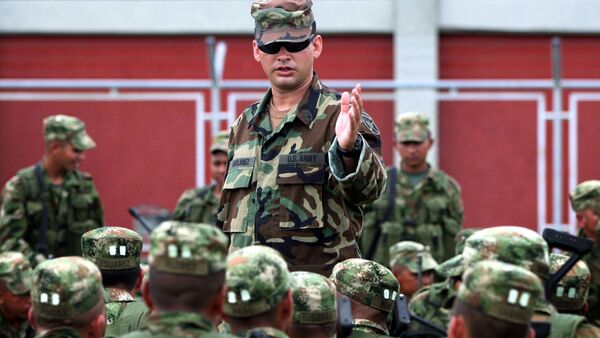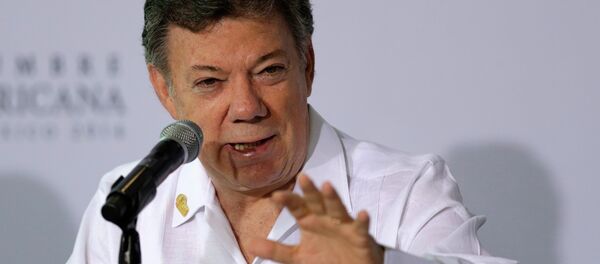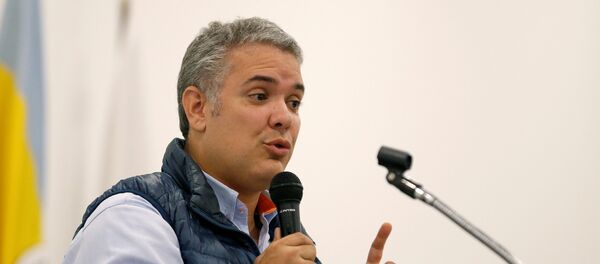Sputnik discussed these issues with Mauricio Santoro, a political scientist at Rio de Janeiro State University.
Sputnik: Colombia will be holding the second round of the presidential election that will be on June 17, let’s talk about the two candidates, what do we know about them and which one is likely to win?
Mauricio Santoro: It’s a very polarized election because Ivan Duque, the leading candidate, is a conservative and he is a harsh critic of the peace deal (of 2016) with the left-wing guerrillas, with the [FARC rebel group]; so if he’s elected there’s a possibility that the peace agreement will be changed. His rival, Gustavo Petro, it is a former guerrilla himself, not from FARC, but from from M-19, another guerrilla group in Colombia, and he represents a very important trend in Latin American politics of [recent] years … where the armed groups who fought against the dictatorships in the region were converted into political parties and started to dispute elections. That happened, for example, in Brazil, in Uruguay, in Venezuela, in many Latin American countries; so we are basically seeing in Colombia a conflict between two very different world views, and that will have an impact in Latin American and in the foreign relations of Colombia, so it’s very important election.
Mauricio Santoro: Exactly, Santos himself was also an ally of Uribe, he was his minister of defense, but he started his own history and he became a very different president than Uribe. He won the Nobel Peace Prize because of the peace deal with the FARCs, but then many people in the conservative establishment of Colombia are angry with him, and even Duque is a classical example, and he’s a businessman, a man from the financial markets, and he presents this conservative backlash against Santos and an attempt to return to the time of Alvaro Uribe who is a more harsh type of politician.
Sputnik: What are the polls suggesting now because, of course, in the first election they came quite close, didn’t they? But now I've been talking to several experts on the air and they seem to be certain that Duque will win?
Mauricio Santoro: I’m not sure about that because it’s a very competitive election. In the first [round of] in the election Sergio Fajardo was the left-wing man as Gustavo Petro is in the second one, so there is a possibility of an alliance between the different left and center-left groups in Colombia and that could change the election. Duque is still the favorite, but he was expecting a much better result than the one that he achieved in the first round of the election, so nothing is certain, and there is a big deal of instability in Colombia right now.
Sputnik: Let’s talk about the fact that the country will join the North Atlantic Alliance and will become the first nation in Latin America nation to do so, obviously Santos seemed very upbeat about this and talked about this as a very big coup, perhaps, even a personal coup for him and an achievement, how much would Colombia benefit from joining NATO?
Mauricio Santoro: What Santos is trying to achieve is to place Colombia in the [Western] block as an ally of the United States and the European Union, especially in the fight against organized crime, against the drug cartels and so on. The problem is when he’s choosing NATO as an ally he’s creating problems with many Latin American countries, not just Venezuela who has a difficult relationship with the United States, but also with moderate countries such as Brazil, because for Brazil the Amazon region, where part of Colombia is located, it’s a very safety strategic region for Brazil, and Brazilians don’t want the United States or NATO going there. It will create diplomatic problems for Colombia with the Latin American countries.
Mauricio Santoro: It's important news, Colombia is not the first Latin American country that tried to join NATO; eight years ago, for example, Argentina tried to do the same but it was rejected by NATO, and for Colombia it’s a matter of political prestige, of trying to achieve a higher level of diplomatic influence with the United States and the European Union, the difference is that Colombia is a much more important country for them than Argentina because of the drug market and also because of the left-wing guerrillas in Colombia, the peace deal, so it’s really achieved a level of diplomatic influence that made the deal with NATO something attractive to the United States and the European Union, so it may work for Colombia, but it will have a price in their relations with other Latin American countries.
Sputnik: Do you see other countries in Latin America also following suit and joining NATO?
Mauricio Santoro: No, not really right now, what [has been] happening in Latin America in [recent] years is that the countries are disappointed with the United States, especially after the election of Donald Trump as president, because Trump is seen as somebody who doesn’t have a positive agenda towards Latin America and someone who has a very negative view of the region, very racist comments about Latin Americans, not just Mexicans or Central Americans, but about the region in general, and what’s happening right now is that Latin America is trying to find alternatives towards China, towards Asia-Pacific countries, because trade and investment is going in that direction, so I don’t think that the option that Colombia had about NATO is something that’s going to be influential to Latin America right now, perhaps; it might have some influence in countries such as Peru or Chile, they have a more sympathetic view of NATO, but it’s going to be something limited.
The views and opinions expressed in this article are those of the speaker and do not necessarily reflect those of Sputnik.






